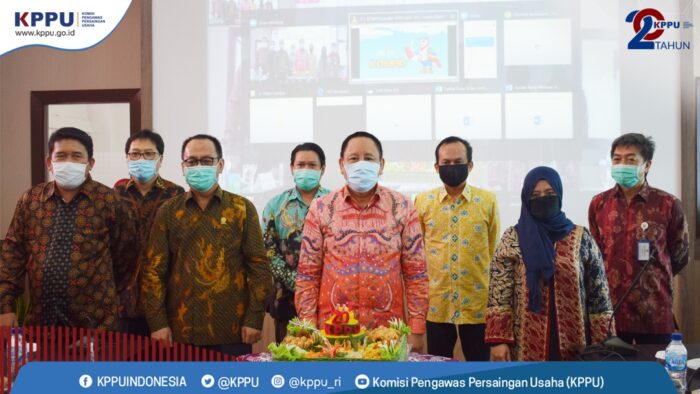TWENTY YEARS OF ICC: HOW IT WORKS.

The Indonesia Competition Commission (ICC, or domestically known as KPPU) entered its two decades in June 7, 2020. Not a small number for a state commission resulting from an economic reformed. After 20 years, ICC overseeing competition through four instruments, namely law enforcement, providing policy recommendation, assessment of mergers and acquisitions, and oversight of the implementation of business partnerships.
Enforcement of competition law is the main instrument of ICC in supervising the implementation of Law No. 5/1999. The performance is measured by the ability of ICC to conclude the case. Over the past 20 years, ICC has issued 349 (three hundred and forty nine) decisions. On objection to the decisions, ICC has won 56% of objection on the District Court level, 58% cassation at Supreme Court level, and 80% of extraordinary judicial review. Thus, from the total number of Decisions, 89% of them have been affirmed (from ICC, District Court, and Supreme Court level (including Judicial Review). While the other 11% are still in the objection proceedings.
The affirmed decision generates total administrative fines as much as IDR 800 billion (IDR 814,850,972,915 to be exact). When compared, this number is equivalent with 48% of the total state budget given to ICC in 20 years. From this amount, 52.2% (or IDR 425,341,670,470) was already paid by the reported parties to the State Treasury. In the case of merger control, ICC has conducted its assessment on 640 (six hundred and forty) notifications of merger and acquisition transactions in the past 10 years, since the enactment of Government Regulation Number 57 Year 2010.
The second performance reference is competition policy reform. In 20 years, the ICC has issued 232 (two hundred thirty-two) letters of policy recommendation to the Central and Regional Government. Most of it were provided to sectors like construction, trade and transportation industries. The policy recommendations were supported by 175 (one hundred and seventy five) studies that have been done by ICC, and the conducting of these studies were assisted by 117 (one hundred and seventeen) formal cooperation established by ICC with various partners, both domestic and international partners.
The third performance reference is good governance. ICC has shown good financial management performance. This was proven by the status of “Unqualified Opinion” that has been obtained by ICC in 7 (seven) years in a row since 2012, from the Audit Board of Republic of Indonesia. For this 20-year celebration, ICC carries the theme of “Competitive and Innovative for an Advance Indonesia”. This means that ICC will continue encouraging businesses’ innovation to increase their competitiveness. On a more technical level, ICC has done several innovative reforms in the past year, namely:
1. Renewal of Organizational Structure and Work Procedures, aimed at increasing prevention and policy advocacy programs to central and regional government.
2. Amendment to procedural law by the issuance of ICC Regulation Number 1 Year 2019 which aims to improve the rights of businesses in the case proceedings and to provide settlement of cases through behaviour changes at the Preliminary Hearing, so that the case could be concluded without conviction within a maximum period of 30 day.
3. Amendment to the merger regulation by the issuance of ICC Regulation Number 3 Year 2019 by applying simplified assessment, so that the assessment of merger can be completed within 15 working days. ICC also emphasized that ICC is not an anti-large. Thus the horizontal, vertical and conglomerate mergers are justified in principle.
4. Amendment of Partnership regulations by the issuance of ICC Regulation Number 4 year 2019 which aims to synergize micro, small, medium, and large scale business, as well as to create fair competition environment for small businesses.
5. In order to prevent further outbreak of Covid-19, ICC issued a regulation for law enforcement proceeding by electronic media, to streamline the case proceedings and prevent physical meetings.
In the international competition policy and politics, ICC has succeeded in making competition as one of the main fields in various international agreements between the Government of Indonesia and its trading partners or international organizations. The inclusion of competition policies in international agreements marked with the comprehensive economic cooperation between the Governments of Indonesia and Japan which was agreed on 2007. Since then, competition policies have been adopted in various agreements such as ASEAN cooperation with Australia and New Zealand, ASEAN with six main partner countries, Indonesia with European Free Trade Areas, Indonesia with Australia, and Indonesia with the European Union. These shows that the implementation of competition policy and law as well as ICC’s contribution are not only in domestic scope, but also international. Simply said, ICC’s contribution and the development of Indonesian competition policy and law will be of great attention by the international community.
Twenty years is certainly not a short time for ICC to struggle in creating a fair business environment in Indonesia. With the support of various parties, ICC matured in its best way and we will always be open to any constructive criticisms from parties who also prioritize fair competition. We certainly believe that together we can make ICC as an effective, productive, and innovative agency that upholds their integrity for an Advance Indonesia.





